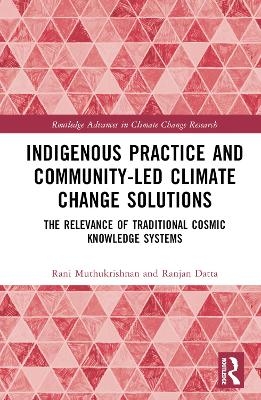
Indigenous Practice and Community-Led Climate Change Solutions
Routledge (Verlag)
978-1-032-48436-5 (ISBN)
This book centers Indigenous knowledge and practice in community-led climate change solutions.
This book will be one of the first academic books to use the consciousness framework to examine and explain humans' situatedness and role in maintaining ecosystems' health. Drawing on teachings from the Indigenous Adi-Shaiva community, the authors present up-to-date research on meanings and implications of South Asian traditional cosmic knowledge, which focuses on relationality and spirituality connected to climate change. This knowledge can create innovative climate change solutions in areas including land, water, traditional management, sustainability goals and expectations, and state development projects. Overall, this book provides an innovative framework for nonviolent climate solutions, which has its foundations in a traditional cosmic and consciousness-based context.
This book, which aims to bridge the gap between Indigenous and Western perspectives by re-educating researchers and decolonizing popular climate change solutions, will be of great interest to students and scholars studying climate change, conservation, environmental anthropology, and Indigenous studies on a broader scale.
Rani Muthukrishnan, Ph.D., Director of Research Compliance, Texas A&M University, San Antonio, Texas, USA. Rani’s research interests include consciousness science and diversity of divine feminine manifestation based on the Vedagama tradition, human-nature interaction, nature-culture intersection, children’s cognition of nature, advocating for women's roles in relation to nature, culture, and sustainability, and impact of climate change on biodiversity. Ranjan Datta, Ph.D., Canada Research Chair in Community Disaster Research at Indigenous Studies, Department of Humanities, Mount Royal University, Calgary, Alberta, Canada. Ranjan’s research interests include advocating for Indigenous environmental sustainabilities, responsibilities for decolonial research, Indigenous water and energy justice, critical anti-racist climate change resilience, and cross-cultural community research.
Chapter 1: Introduction Chapter 2: Decolonizing Positionality Chapter 3. Consciousness Framework Chapter 4. Methodology Chapter 5. Antiquity and Scientific Legitimacy of Consciousness Framework for Climate Change Chapter 6. The Value of Sarvajnapeeta in Handling Climate Change Chapter 7. Charyapada - Significance of the Lifestyle in Climate Change Chapter 8. Advocating for Traditional Knowledge-Based Climate Change Solutions Chapter 9. Operationalizing Consciousness Framework for Achieving Climate Change Solutions Chapter 10. Role of Colonization and Neo-Colonization on Climate Change Chapter 11. Protecting Traditional Land-based Conscious Traditions for our future
| Erscheinungsdatum | 05.12.2023 |
|---|---|
| Reihe/Serie | Routledge Advances in Climate Change Research |
| Zusatzinfo | 16 Line drawings, black and white; 2 Halftones, black and white; 18 Illustrations, black and white |
| Verlagsort | London |
| Sprache | englisch |
| Maße | 156 x 234 mm |
| Gewicht | 520 g |
| Themenwelt | Naturwissenschaften ► Biologie ► Ökologie / Naturschutz |
| Sozialwissenschaften ► Ethnologie | |
| Sozialwissenschaften ► Soziologie | |
| Technik ► Umwelttechnik / Biotechnologie | |
| ISBN-10 | 1-032-48436-5 / 1032484365 |
| ISBN-13 | 978-1-032-48436-5 / 9781032484365 |
| Zustand | Neuware |
| Informationen gemäß Produktsicherheitsverordnung (GPSR) | |
| Haben Sie eine Frage zum Produkt? |
aus dem Bereich


